
Zhejiang is a seafood lover’s dream come true. Zhejiang cuisine (or Zhe Cuisine) boasts exquisite seafood dishes and is ranked as one of the eight major cuisines in China.
The extensive variety of seafood dishes is the main allure of Zhejiang cuisine, although most foreign travelers find the artistic refinement attractive as well. Zhejiang is known as a wealthy and sophisticated province, and its elegant cuisine truly reflects that.
Zhejiang cuisine
Looking for a sophisticated seafood dining experience? Why not join us on a Hangzhou tour, the picturesque capital of Zhejiang, and enjoy fine dining in our carefully selected restaurants.
But before you go, let’s dive into the rich culinary history of Zhejiang.
Zhejiang province, the land of fish and rice
Zhejiang province has been known as the land of fish and rice since ancient times. According to written records, Zhejiang cuisine dates all the way back to the Hemudu Culture in the Neolithic Age and took further shape in the period between the Han Dynasty and Tang Dynasty. (202 BC – 907 AD).
Its coastal location makes for an abundance of fish and seafood, with over 500 different nutritious and unique species. Further inland, the southwestern highlands are rich with mountain delicacies, while the northern part of the province offers plenty of freshwater foods.
With such a rich variety of resources, it’s easy to carefully select the most exquisite ingredients for high-quality Zhejiang dishes. Zhejiang cooks prefer using seasonal ingredients to ensure freshness, and to highlight the natural flavors.
Zhejiang cuisine is worldwide renowned for its many different cooking techniques. Zhejiang cooks are particularly good at sautéing, frying, stewing, stir-frying, steaming, or roasting the ingredients in a way that preserves and enhances the original flavors of the ingredients. The same goes for seasoning.
The four famous local cuisines of Zhejiang province
Zhejiang cuisine can easily be divided into the following four local cuisines:
Hangzhou cuisine
Since becoming the province capital, Hangzhou cuisine has become quite popular. Hangzhou food features freshness and lightness. Stir-fried, steamed, or pot-roasted dishes, elegantly displayed on your plate. The story goes that Hangzhou cooks include bamboo shoots in at least half of their dishes.
Ningbo cuisine
Ningbo cuisine features fresh and salty seafood, with an emphasis on the original flavor of the carefully selected ingredients. Ningbo cooks have their own unique way of quick-frying, stir-frying, deep-frying, simmering, and steaming to make sure the food is tender and fresh.
Shaoxing cuisine
Have a taste of the rural charm of Shaoxing. Shaoxing cuisine boasts mild and refreshing flavors and includes fresh ingredients such as fish, shrimp, poultry, beans, bamboo shoots, and many more. Raw ingredients are usually steamed or stewed with the famous Shaoxing rice wine.
Wenzhou cuisine
With over 30 different cooking methods and more than 250 seafood dish varieties, Wenzhou cuisine is anything but boring. Wenzhou locals have very special ways of preparing and their seafood. For instance, drying fresh yellowfin tuna, soaking jellyfish, or eating live shrimp with a hint of local rice wine, sugar, and ginger. Wenzhou cooks place great importance on the art of cutting food, and an aesthetically pleasing result.
The many legends of Zhejiang cuisine
Many Zhejiang dishes have an alluring story to tell, from the steamed grass carp in vinegar gravy to the beggar’s chicken. Here from all the options that Zheijiang cuisine has to offer are four of the best legendary Zhejiang dishes (not just seafood, but also pork and chicken) that are worth a try:
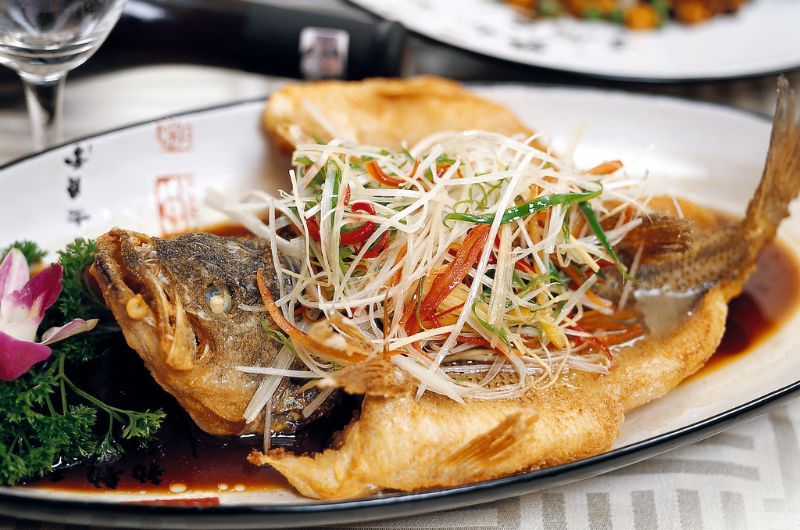
Steamed grass carp in vinegar (Xihu Cuyu)
Steamed grass carp in vinegar is known as the most famous dish in the Hangzhou area. The taste of the fish is tender and goes really well with the sharp sweet and sour, vinegar-based sauce. The story goes that before cooking, a fresh alive grass carp is kept hungry in clear water for two days for cleansing, before being cut in half from head to tail (but not separated), delicately poached, and then served eyes-up.
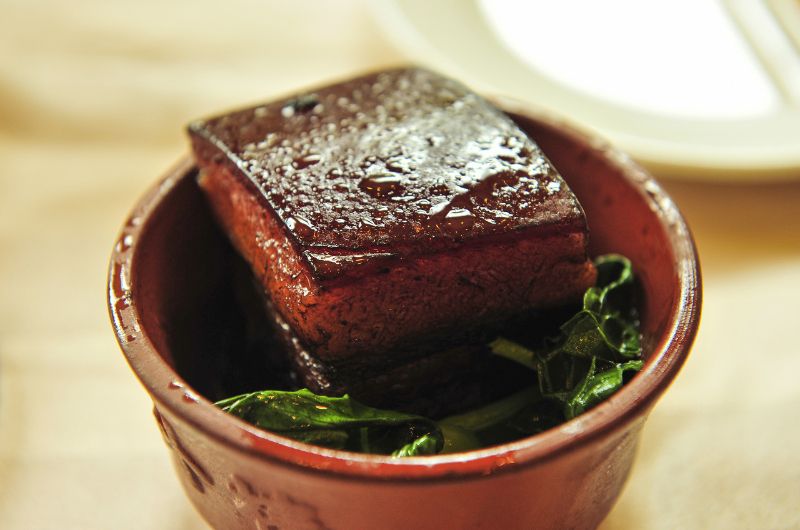
Dongpo pork (Dongporou)
Whilst seafood is a major part of Zhejiang cuisine, the area also has some delicious meat dishes including Dongpo pork. Dongpo pork is braised pork belly, made from half fatty, and half lean pork belly meat braised with a lot of Shaoxing rice wine. Legend says, the dish is named after a revered poet, calligrapher, and artist from the Song Dynasty, Su Dongpo, who is supposed to have invented, or at least inspired Dongpo pork as we know it.
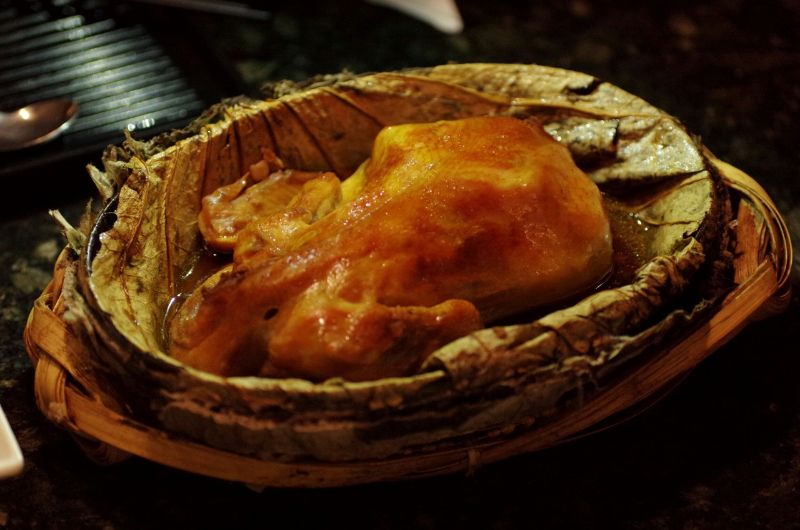
Beggar’s chicken (Jiaohua Ji)
Did you know it can take six hours to prepare a single serving of Beggar’s chicken? Beggar’s chicken is chicken that is stuffed, wrapped in clay, and slowly baked at low heat. Rumour has it, a beggar stole a chicken from a farm. However, he didn’t have any pots or utensils, so he improvised. He wrapped the chicken in lotus leaves, encased it in mud, and buried it in a hole in the ground where he had lit a fire. After a while, he dug up the chicken and cracked open the mud, which revealed a delicious roasted chicken inside.
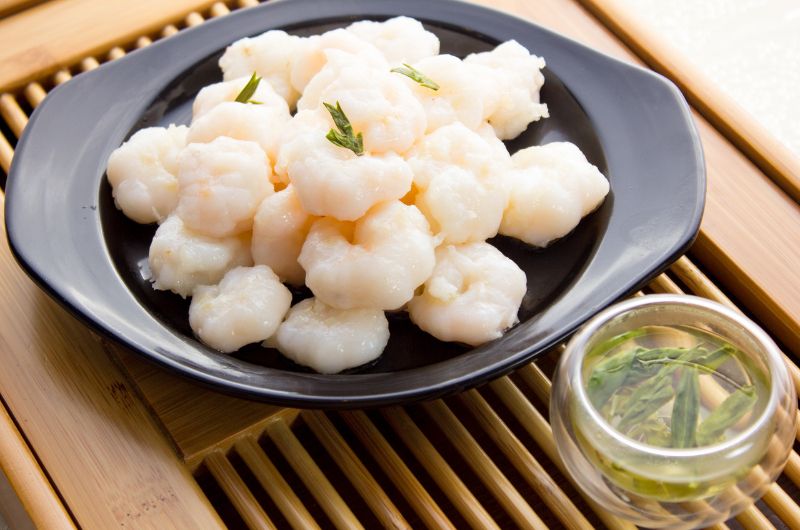
Stir-Fried shrimps with Longjing tea (Longjing Xiaren)
Stir-fried shrimps with Longjing tea is a delicacy originating from Hangzhou. It’s an elegant looking dish, with white and green colors, and light and fragrant flavors. Legend has it, an imperial chef mistakenly dropped some Longjing tea leaves while stir-frying shrimp for the emperor. A classic Zhejiang dish was born.
Explore the REAL China with ChinaTours.com
Want to experience the legendary flavors of Zhejiang cuisine? Our Hangzhou Tours cover the area’s highlights and give you the opportunity to explore the true taste of its exquisite cuisine. Book online or talk to our China tour experts today.
Looking for flexible China tour package options? ChinaTours.com can help. Our tours are designed to be flexible. We understand not everyone travels the same way. Some explorers enjoy their independence. Others like to travel with a group. The good news is the best China tours do both. Flexible travel options mean you can join a group tour for part of a tour and then travel independently to other destinations in China. And we can arrange every detail. Want to know more? Enquire now.


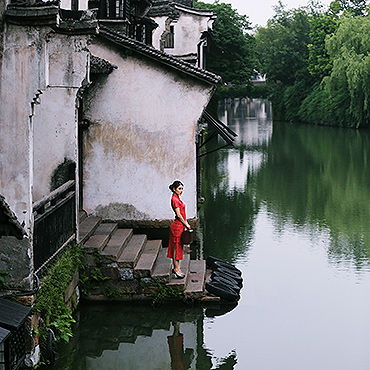

 Once in a life time. Don’t miss it!
Once in a life time. Don’t miss it!




